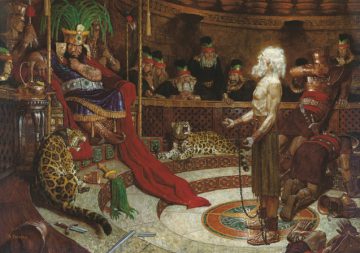
This past summer I had several chances to take in several peaceful campfires in the mountains of Utah and Idaho. There is something captivating and gripping about looking into a campfire. For me, campfires are marvelous tools for self-reflection and introspection. I like to think eternal truths can gently wash over me while looking into the soft flames on a quiet evening – if I will search for them and if I am willing to receive them.
It struck me this year that there are few things in the world that make for a better example of what it means “to dwindle” than a good campfire. A campfire is either growing in intensity and strength due to the addition of fuel, or it is ebbing, waning, fading, and dying. There is no middle ground in the life of a campfire, and yet the changes that take place when one is weakening are subtle and almost imperceptible. Second to second, there are indistinguishable differences in the amount of light and warmth it produces. In the moment, it is difficult to tell that there is any process or change taking place at all. If we are unaware of the process, we will miss seeing any difference at all until a substantial change has already taken place. This slight and almost indiscernible weakening and diminishment of warmth and heat can also be described as dwindling.
I think there is value in looking at some of the definitions of the term “dwindle”. A few definitions include the following:
“to become gradually less until little remains” (American Heritage Dictionary)
“to grow or cause to grow less in size, intensity, or number; diminish or shrink gradually ” (Collins English Dictionary)
“to become smaller and smaller; shrink; diminish, to fall away, as in quality; degenerate.” (Webster College Dictionary)
Other common synonyms include the words decline, sink, weaken, shrink, decay, whither, shrivel, peter out, reduce and taper.
In the Book of Mormon, the word dwindle is used 26 times, nearly always paired with dwindling “in unbelief”, and found within nine different books. Prophets in the Book or Mormon frequently remind us of the divine providence they received in directing and targeting their teachings for us in our day. (Examples include Mormon 8:35 and 3 Nephi 26:12) I have decided that the Book of Mormon prophets’ repeated warnings with regard to dwindling ought to cause myself caution – and maybe even alarm.
Mosiah 1:5 tells us that when the written scriptures and commandments of God aren’t before our eyes, we will dwindle. Alma 50:22 shows that faithfully keeping the commandments leads us to deliverance, while not doing so will lead to dwindling. Helaman 4:23 states that because of iniquity the church dwindled, and testimonies of Christ faltered. The book of 4 Nephi speaks of a people that dwindled “from year to year”. Can I look back at my life and see days, months, and even years that I didn’t grow as much as I should have because of dwindling? Yeah, sadly I can. In Mormon 9:20, dwindling in unbelief is paralleled with departing from the right way and knowing the God in whom we should trust. And we are warned that God’s miracles in our lives cease when we dwindle. I need His miracles in my life!
I have been thinking about what “dwindling in unbelief” would look like in today’s world and in my life. It may be found in slightly shorter and less heartfelt prayers each day, or even skipping prayers here and there altogether. It may be in almost imperceptibly weaker fasts month to month. It may be a little less focus on the Savior in my life and a little less effort to have his Spirit with me. It may be more and more time on social media seeking the world’s validation. It may be a little less diligence studying the scriptures each day, or more and more time passing by without studying at all. It may be an increasing focus on the world and material things, and less focus on things of the spirit. It may be frittering away precious time sitting in front of the television, surfing the web, overindulging in hobbies, or just plain spending time on things that won’t help me grow closer to Christ. Words like casual, periodic, sporadic, and irregular seem to describe dwindling in my life. Dwindling in unbelief can be remarkably subtle, gradual and difficult to recognize. Before we know it we can find ourselves on the outside looking in, or worse yet, on the outside throwing rocks in frustration.
The campfire of our testimony is in constant need of rekindling. Testimonies are either growing or they are diminishing! A fiery redetermination and continual recommitment to serve the Lord is the antithesis of dwindling. An effort to actively grow our testimony will fight the fade. Diligently, patiently, faithfully nourishing the word will defeat the decay. Praying with all the energy of our heart will reverse the decline in our spirituality. It may be that the remedy to dwindling is found in words like intensity, passion, might and strength. I think the long-term solution to overcoming the danger of dwindling is found in Christ-like habits, routines and patterns.
Though dwindling is hard to see in the moment, looking back in my life it is easy to see bigger-than-I-want-to-admit chunks of time that were dwindled away. I have dwindled far more than enough in my life to know its terrible cost, and I am trying to better recognize dwindling and more quickly beat it out of my life. Dwindling happens when I am least prepared to recognize it. I have also felt periods of intense spiritual feasting, and I am trying to better define what it takes to prolong and intensify those periods as much as possible.

